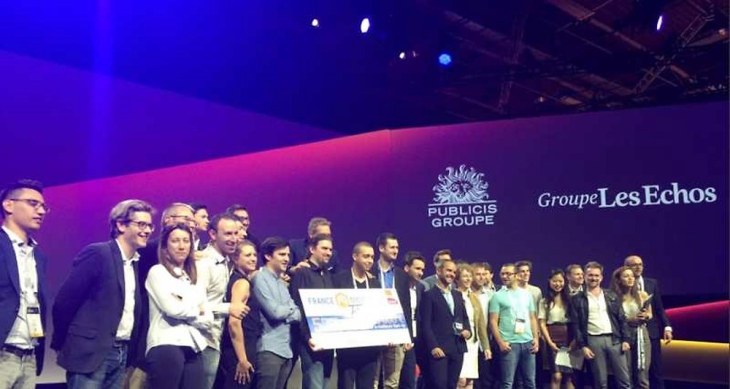Something big happened in France over the last five years. Perhaps it was the economic crisis that added some much-needed shock-therapy. Perhaps it was an increasing friendliness toward tech entrepreneurship by the government. Indeed, yesterday the government passed a seismic new bill — the so-called “Digital Republic” bill — allowing far greater access to public data, net neutrality and much more. Whatever happened, France is now well on its way to creating a far better environment for startups. At the same time, the Paris tech scene is picking up speed, with many large tech companies accelerating, such as Withings, Gameloft, Happn, Deezer, Parrot drones and BlaBlaCar all now motoring along.
What Paris needed was a big event to bring this all together. With the demise of the long-standing Le Web conference, there was a big gap to fill. In addition, France has no CES, IFA (the list goes on) or, for that matter, DLD, Davos or Disrupt to concentrate the tech scene. Nor did it have anything to bring France’s considerable “big-company” culture to connect with startups. The irony is that, just as the U.K. — traditionally the biggest tech hub in Europe — “Brexits,” France is getting its act together.
This was the vision of Maurice Levy, head of the marketing and communication giant Publicis. Without any history in the tech event space, it would have been hard to get something really big off the ground in France. But this is effectively what Levy has managed to pull off, from a standing start, together with major newspaper Les Echos.
“We don’t have the same ecosystem as the U.S.,” Levy admitted in an interview with TechCrunch, “which is why it makes sense to combine startups with the large corporate sector.” Levy’s vision is to offset the relatively (compared to the U.S. or U.K.) smaller size of the French VC market with much greater corporate engagement and funding, to allow startups to access established markets much faster.
Viva Technology Paris, or Vivatech for short, is somewhat akin to a TechCrunch Disrupt, but with a broader mix of corporate and government involvement.
While the event is still in its infancy, this week, 35,000 people registered for the three-day conference (around 15,000 passed through each day), which will also open its doors to the French public on the last day, a Saturday. The impact of this kind of act can’t be underestimated. France for a long time has been renowned for its engineering skills. On Saturday, moms, dads and kids will flood into the pavilions to get a taste of what tech entrepreneurship looks like in the flesh.
Levy has also been putting his money where his mouth is, announcing a €10 million fund to back startups.
And today 90 startups were showcased as part of the Publicis90, a global initiative to support 90 startups (so named after the company’s 90th anniversary).
Ninety of the most innovative startups or scale-ups were selected by a jury composed of executives like Stéphane Richard (Orange), Carolyn Everson (Facebook), Carlo D’Asaro Biondo (Google) and SY Lau (Tencent). Other partners included Henner Group and Iris Capital.
More than 20 percent of all submissions came from the U.S.; 18 percent from France and 14 percent from the U.K., followed by Germany (7 percent), Israel (6 percent) and India (3 percent).
Twenty-five projects were “intra-preneurs” (entrepreneurs from within Publicis Groupe), while the remaining 65 projects were from outside. The full list of the 90 participants is available at Publicis90.com.
The top three winning startups were:
- Emerald Medical Applications: “an Israeli startup specialized in dermatology that uses state-of-the-art image recognition technology for faster, easier detection of skin cancers.”
- Recast.ai: “the first French startup founded by School 42 graduates, is a collaborative platform allowing developers to create a bot and implement it on any messaging service. Developers can extract usable data from textual and voice expressions through vocal recognition technology.”
- Wiseye: “an Israeli startup specialized in retail and the Internet of Things providing retail and store chains with a customer behavior platform that draws in data from various sources like point-of-sales, wireless devices and other available inputs.”
The background to this has been a gargantuan effort, and one that till now has been somewhat alien to French corporate culture. Some 76,000 Publicis Groupe employees were able to submit their ideas for a startup, as well as taking submissions from around the world. This amounted to 3,732 applications from 141 countries.
This was boiled down to 320 applications, which was again whittled down to 90, with Publicis Groupe employee submissions amounting to 20 percent of the total shortlist.
Each of the 90 finalists selected will be awarded between €10,000 and €500,000 of investment, with other services from Publicis thrown in.
Publicis and other partners are now in the process of creating a big fund that will have a first closing in September, but which is reputedly on its way to raising about €550 million. So in other words, this broader initiative is off to a flying start.
